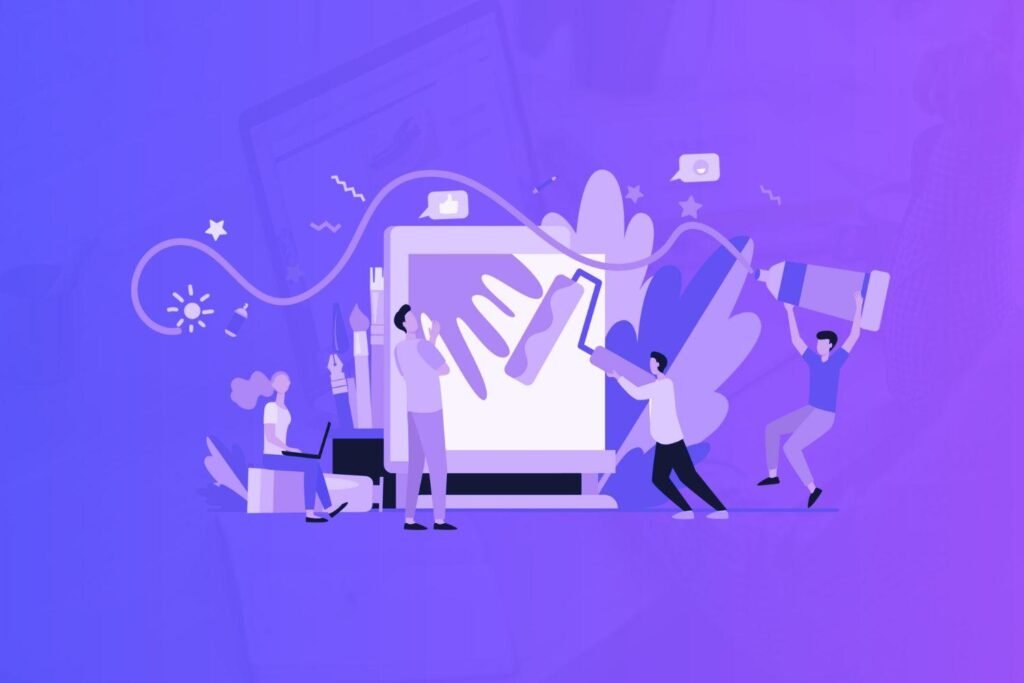Picture this: You’re ready to create that logo you’ve been sketching in your notebook, but then you see Adobe Illustrator’s price tag. Ouch.
Or maybe you’re already paying for it, watching those monthly fees add up while you only use a fraction of its features.
You’re not alone. Thousands of designers, hobbyists, and small business owners face this same dilemma every day. The good news? The creative software landscape has exploded with Adobe Illustrator competitors that might surprise you.
So, in this list, I’ll walk you through the best Adobe Illustrator alternatives.
Disclaimer: If you buy any products through links on this site, I may earn a commission. But it doesn't make any difference to your cost, and it helps me keep this blog running. So you could always read my articles for free.
Why consider alternatives to Adobe Illustrator?
Before you commit to any design software, it helps to understand why so many people are exploring options beyond Adobe Illustrator. Let’s look at the practical reasons driving this shift.
The cost factor hits hard
Adobe Illustrator runs on a subscription model that costs around $23 per month. That’s $276 yearly for just one program. For freelancers starting out or small businesses watching every dollar, this adds up fast.
Here’s the thing: You might only need vector design software for occasional projects. Paying monthly fees when you use the software just a few times makes little financial sense.
Some alternatives to Adobe Illustrator offer one-time purchases or even free options that handle basic to intermediate design work perfectly well.
Sometimes less is actually more
Illustrator packs in hundreds of features. But ask yourself – do you really need all of them? Many users find themselves overwhelmed by options they’ll never touch.
Take the case of a small business owner who just needs a tool like Adobe Illustrator to create simple logos and social media graphics.
Learning Illustrator’s complex interface might take weeks, while a simpler alternative could get them designing in hours.
Technical barriers matter too
Beyond complexity, Illustrator demands serious computer power. Your machine needs substantial RAM and processing speed to run smoothly.
If your computer struggles, you might need other platforms similar to Adobe Illustrator, or you’ll waste time waiting for files to load and tools to respond.
Additionally, Illustrator works best within Adobe’s ecosystem. Want to quickly edit a design on a different device or share it with someone who doesn’t have Adobe? You might hit roadblocks.
These limitations explain why the search for Adobe Illustrator alternatives has grown. The next question becomes: what options actually deliver on their promises?
What are the top Adobe Illustrator alternatives?
Now that you understand why alternatives to Adobe Illustrator matter, let’s examine specific options that could replace Adobe Illustrator in your workflow. Each brings its own strengths and limitations, so you’ll want to match them to your actual needs.
Inkscape
This open-source vector editor has quietly built a loyal following among designers who refuse to pay for software. Inkscape is an Adobe Illustrator competitor that can handle most professional design tasks without asking for your credit card.
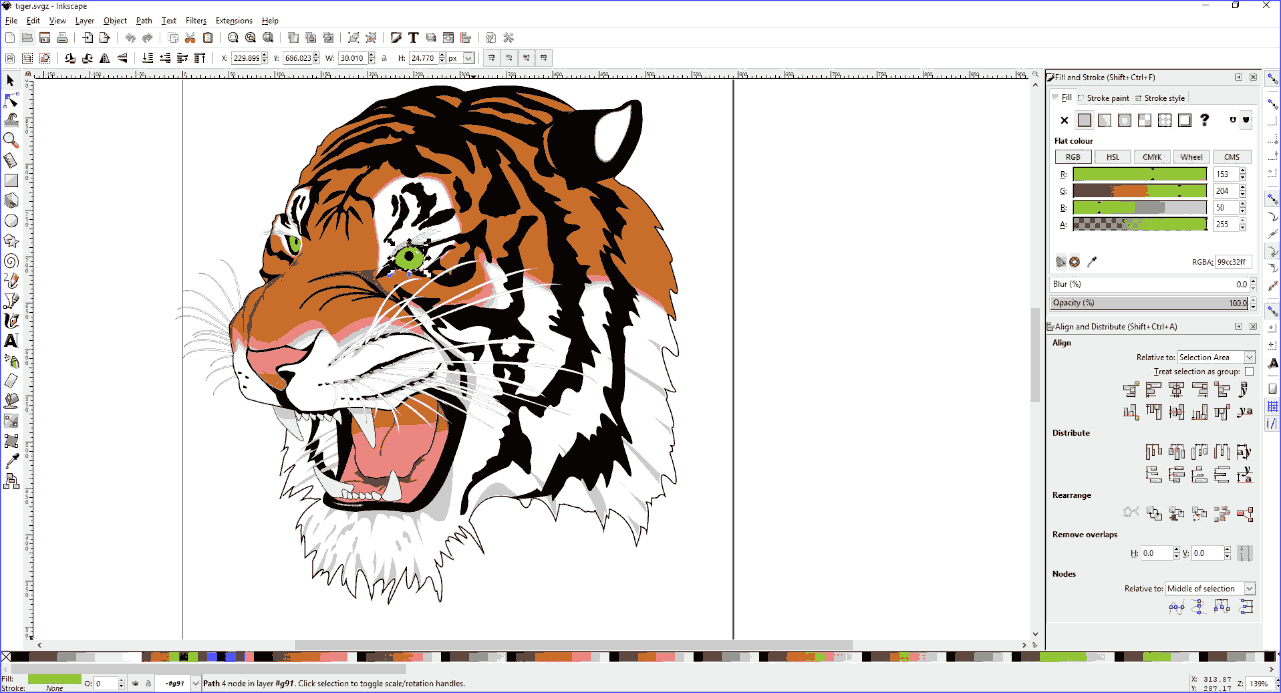
The community behind it keeps improving the software year after year, making it a reliable choice for long-term use.
Key features:
Full vector editing capabilities with bezier curves and node editing
Support for SVG, PDF, EPS, and AI file formats
Extension system for added functionality
Text-to-path conversion and advanced typography tools
Layer management and object grouping
Pros:
Completely free with no hidden costs
Regular updates from an active community
Works on Windows, Mac, and Linux
No subscription or account required
Extensive tutorials available online
Cons:
Interface feels dated compared to modern apps
Steeper learning curve for beginners
Can be slow with complex files
Limited cloud features
Some compatibility issues with newer AI files
My verdict: Perfect Adobe Illustrator alternative for budget-conscious designers who need professional features and don’t mind investing time to learn a less polished interface.
Affinity Designer
Serif’s answer to Illustrator costs just $70 as a one-time purchase. This British-made software targets professionals who want to escape subscription fees by finding a platform like Adobe Illustrator without sacrificing quality.
Many designers switch to Affinity and never look back, finding it meets all their needs at a fraction of Adobe’s cost.
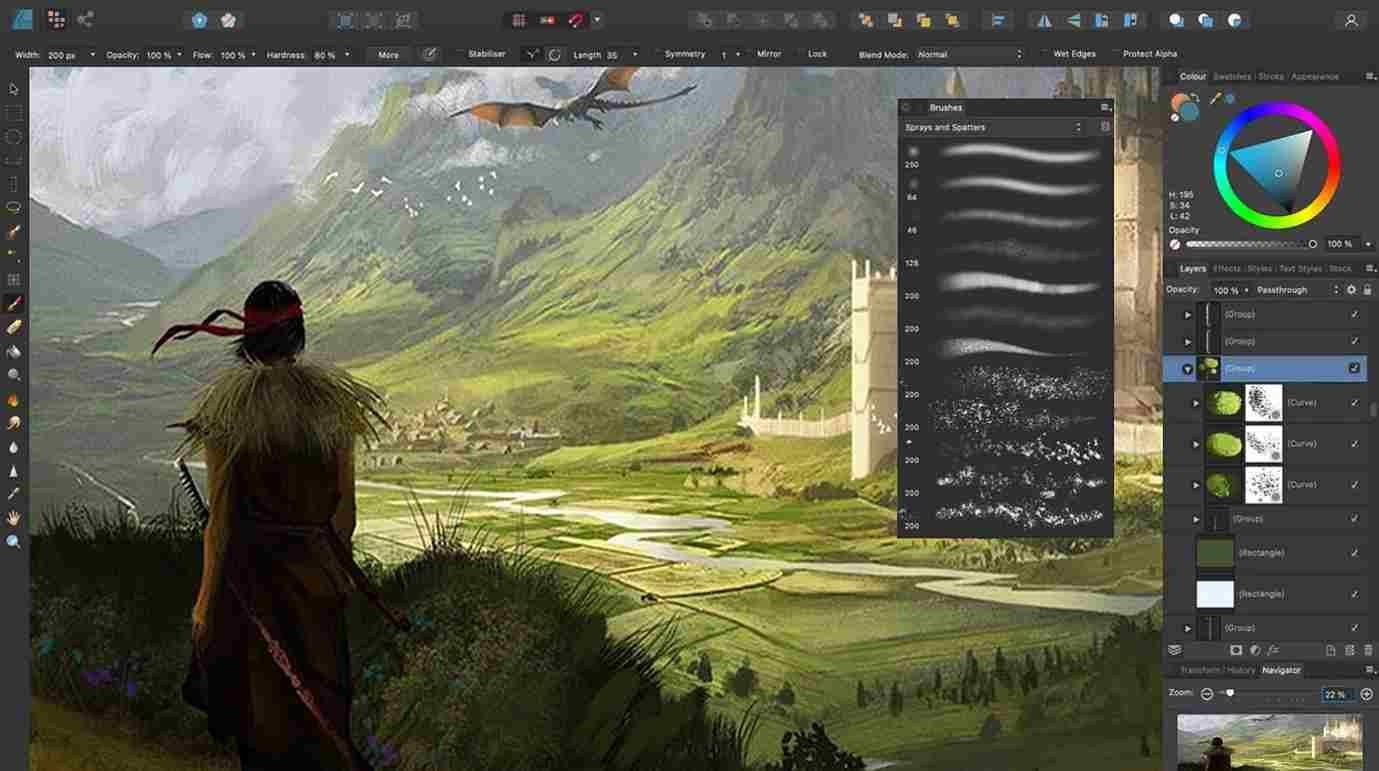
Key features:
Seamless switching between vector and raster workspaces
Real-time effects and adjustments
Unlimited artboards in a single document
Advanced grids and snapping options
Professional print preparation tools
Pros:
One-time purchase with free updates
Fast performance even with complex files
Modern, intuitive interface
Excellent iPad version available
Strong typography controls
Cons:
No auto-trace feature
Limited third-party plugin support
Smaller community than Adobe
Learning curve when switching from Illustrator
No cloud collaboration features
My verdict: One of the best paid alternatives to Adobe Illustrator for professionals who work primarily on desktop and value performance over cloud features.
Vectr
Think of Vectr as the friendly neighbor who helps without asking for anything in return. This free tool, runs in your browser or as a desktop app, making vector design accessible anywhere. Its simplicity becomes its strength, removing barriers that stop people from creating their first designs.
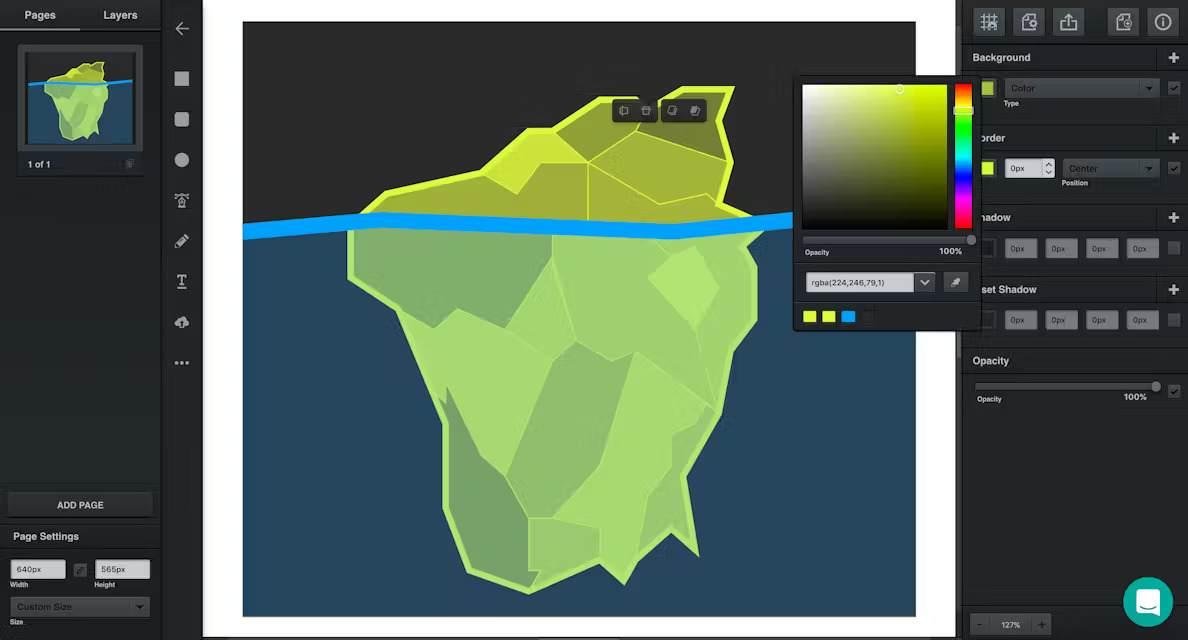
Key features:
Real-time collaboration with team members
Cross-platform syncing
Basic shape and pen tools
Simple layer system
Built-in tutorials
Pros:
Completely free forever
No download required for web version
Automatic saving to cloud
Clean, beginner-friendly interface
Easy sharing via URL
Cons:
Limited advanced features
Basic text editing options
No offline mode for web version
Fewer export options
Can’t handle complex illustrations
My verdict: Among all Adobe Illustrator competitors, Vectr is ideal choice for beginners and casual users who need simple vector graphics without the complexity of professional tools.
CorelDRAW
Before Adobe dominated, CorelDRAW ruled the design world. This Canadian alternative to Adobe Illustrator still offers robust features, especially for print design and technical illustration work.
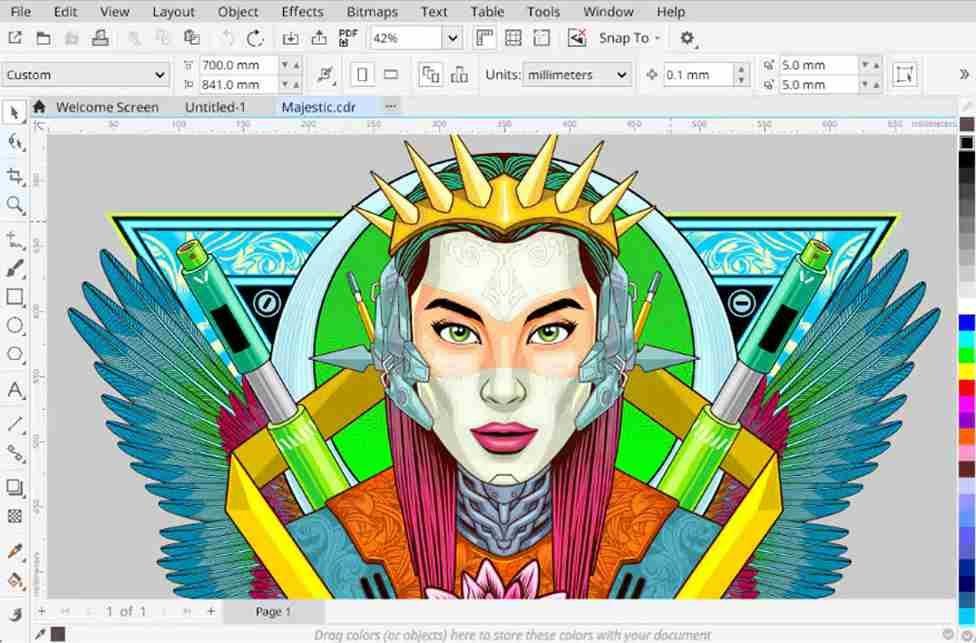
Industries like sign-making and engraving often prefer CorelDRAW among all tools similar to Adobe Illustrator because it speaks their language with specialized tools.
Key features:
Powerful node editing and shaping tools
Built-in barcode generator
Advanced color management
Multi-page document support
Extensive file format compatibility
Pros:
Strong technical drawing capabilities
Excellent for print design
Good customer support
Regular feature updates
Windows touch support
Cons:
Expensive subscription model
Mac version lacks some features
Interface feels cluttered
Steep learning curve
Heavy system requirements
My verdict: Best suited for Windows users in print design or technical fields who need specialized features beyond general illustration.
Boxy SVG
This web-based editor proves you don’t need heavyweight software to create professional vectors. Boxy SVG focuses on doing one thing well: making SVG editing straightforward and accessible.
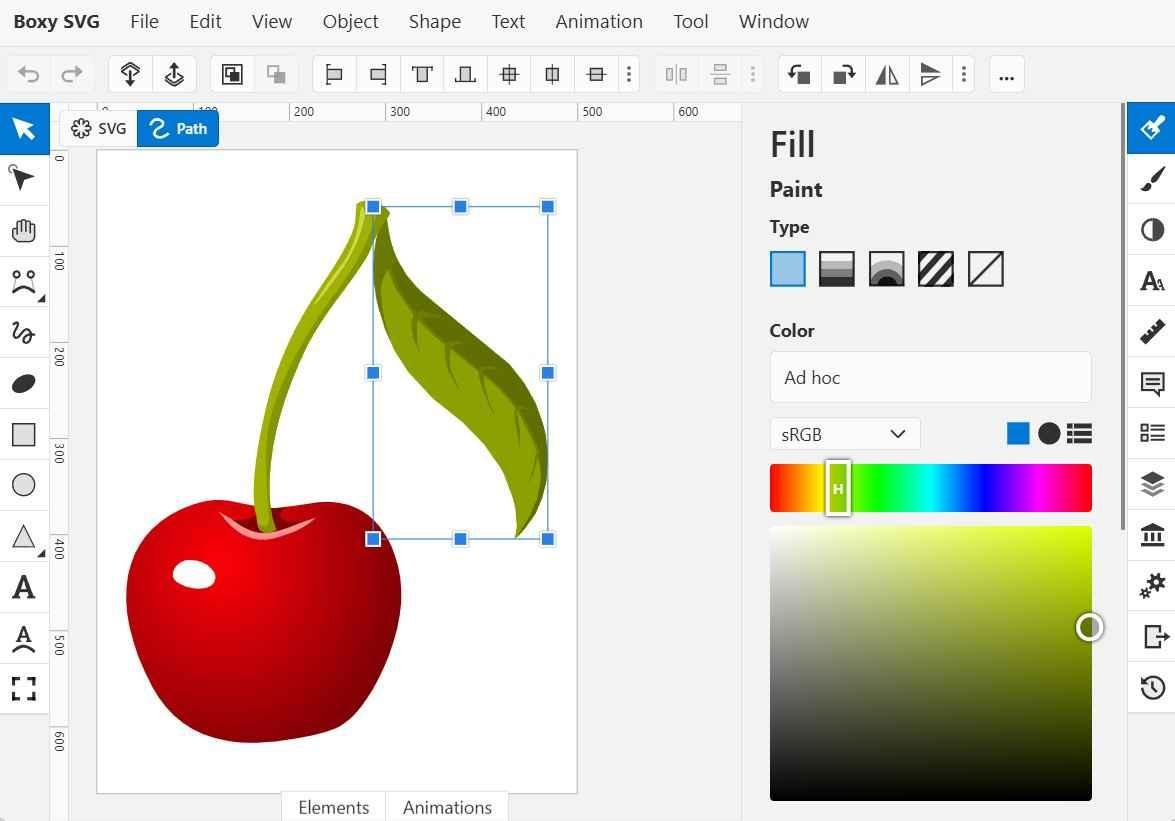
Web developers in need of an alternative to Adobe Illustrator particularly love it because it generates clean code they can use directly in their projects without cleanup.
Key features:
Native SVG editing with code view
Google Fonts integration
Keyboard shortcuts matching Illustrator
Path operations and boolean tools
Built-in image tracer
Pros:
Works entirely in browser
Clean SVG output for web use
One-time purchase option
Lightweight and fast
Chrome app available
Cons:
Limited to SVG format
Basic print features
No advanced effects
Minimal text formatting
Small user community
My verdict: Excellent for web designers who need a tool like Adobe Illustrator with clean SVG files and prefer working directly with web-ready vector formats.
Sketch
Mac users have championed Sketch for years, especially in UI and web design circles. While it started as an Adobe Illustrator alternative, Sketch carved its own path by focusing on digital design workflows.
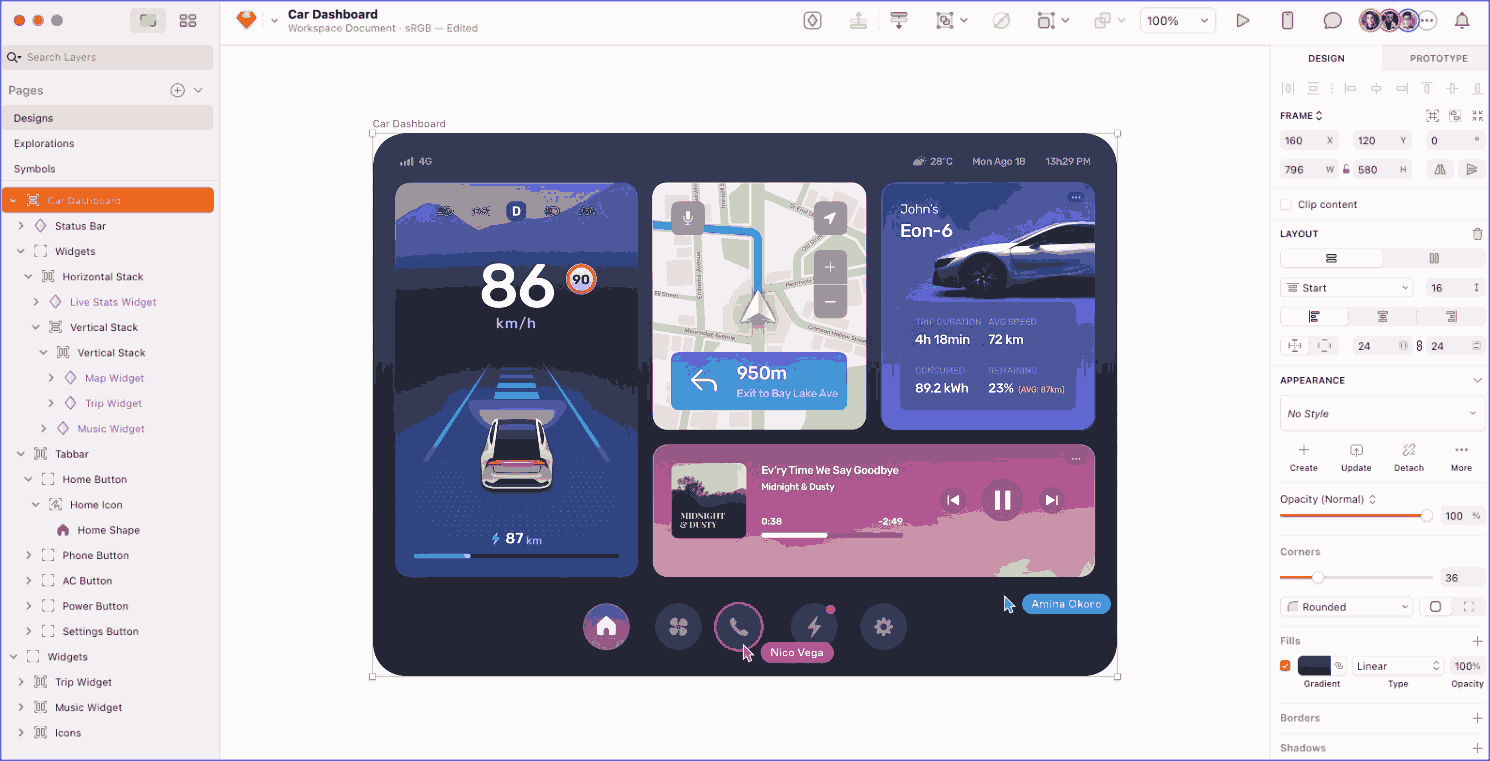
The tool shaped how modern designers approach interface design, even influencing Adobe’s later products.
Key features:
Symbols for reusable design elements
Responsive resizing controls
Extensive plugin ecosystem
Shared libraries for teams
Prototyping capabilities
Pros:
Intuitive for digital design
Strong community support
Regular feature updates
Excellent plugin selection
Smart layout features
Cons:
Mac-only software
Subscription pricing model
Not ideal for print design
Limited illustration tools
Requires learning new workflows
My verdict: The go-to choice for Mac users who want a platform similar to Adobe Illustrator for designing websites and apps, though less suitable for traditional illustration work.
Figma
Figma is an Adobe Illustrator competitor that changed how designers think about collaboration by moving everything to the cloud. This browser-based tool lets entire teams work on the same file simultaneously, like Google Docs for design.
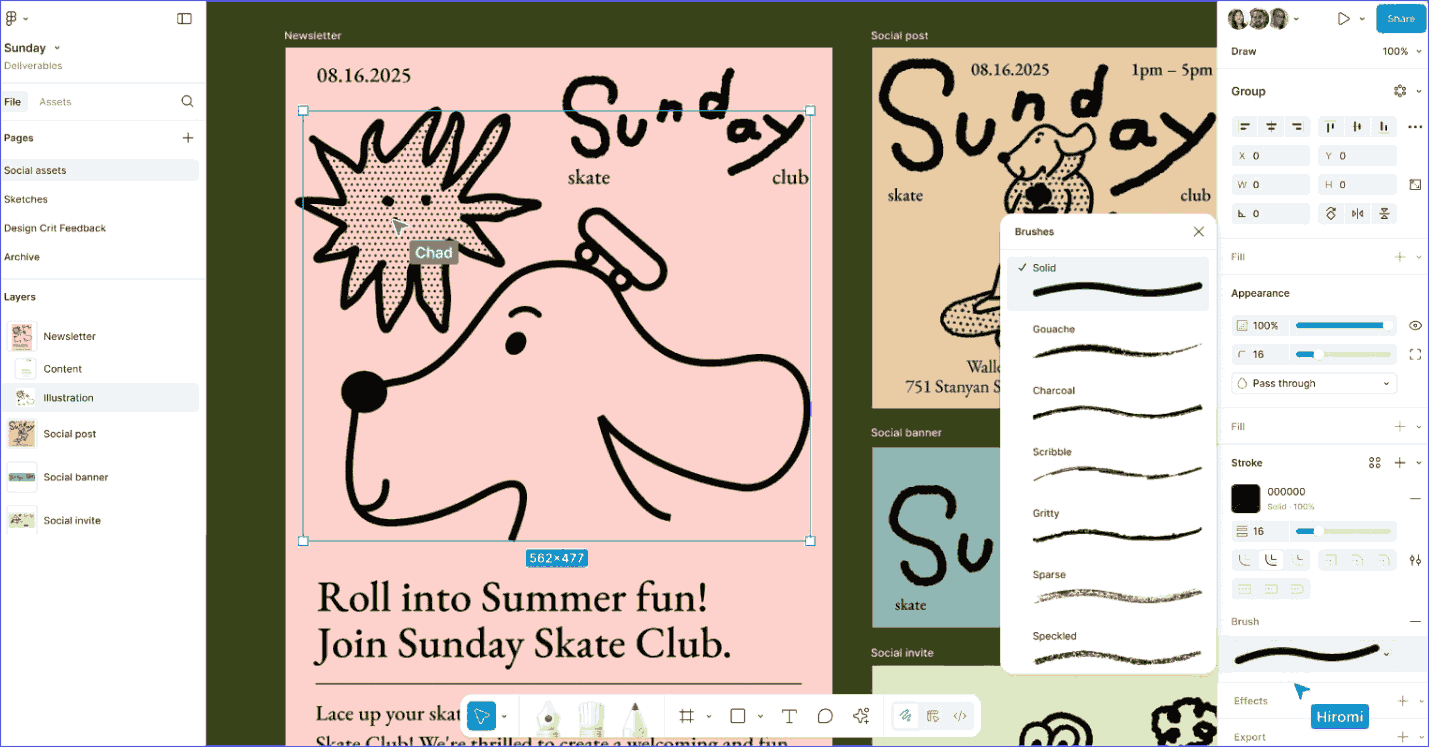
The real-time collaboration features have made it a favorite among distributed teams and agencies looking for Adobe Illustrator alternatives.
Key features:
Real-time multiplayer editing
Version history with branching
Component system with variants
Auto-layout for responsive designs
Developer handoff tools
Pros:
Free tier for individuals
No installation required
Seamless collaboration
Works on any platform
Strong prototyping features
Cons:
Requires internet connection
Limited offline functionality
Not built for print
Basic illustration tools
File organization can get messy
My verdict: Best for teams doing digital design work who prioritize collaboration over traditional illustration features.
Canva
You might not expect Canva on this list of platforms like Adobe Illustrator, but hear me out. While known for templates, Canva quietly added vector editing features that handle basic illustration needs.
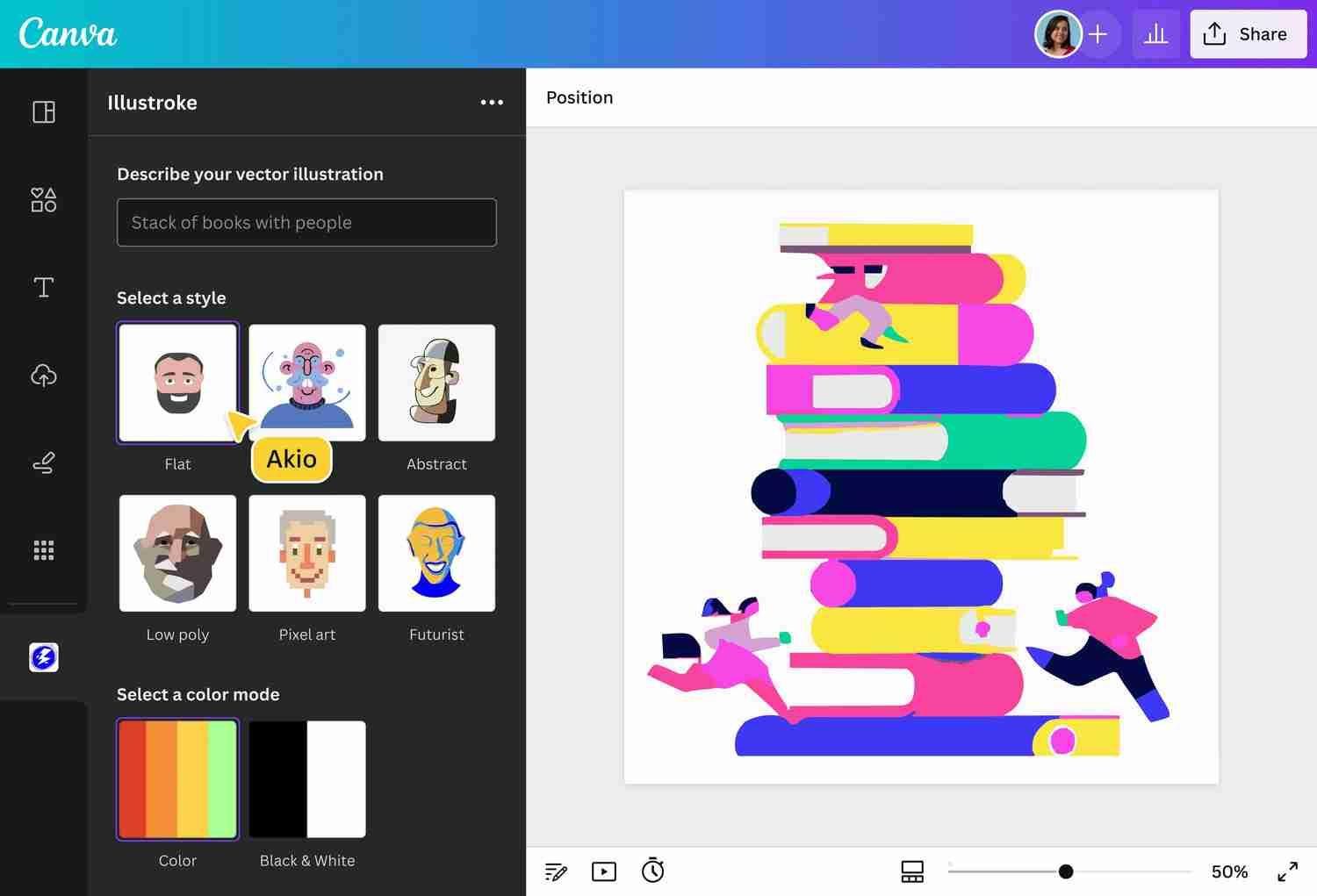
For business owners and content creators who need quick graphics without learning complex software, it fills an important gap.
Key features:
Drag-and-drop vector elements
Extensive template library
Brand kit for consistency
Magic resize for multiple formats
Team collaboration features
Pros:
Extremely user-friendly
Massive asset library
Quick results
Affordable pricing
Mobile apps available
Cons:
Limited custom drawing tools
Template-dependent workflow
Subscription for full features
Not for complex illustrations
Export limitations on free plan
My verdict: One of the best alternatives to Adobe Illustrator for non-designers who need professional-looking graphics quickly, though artists will find it too limiting.
Review: Canva review
Adobe Fresco
Adobe’s response to Procreate might seem odd here, but Fresco includes solid vector brushes alongside its painting tools. Artists who want to blend vector and raster work in one app find Fresco bridges that gap. The touch-first design makes it especially appealing for tablet users.
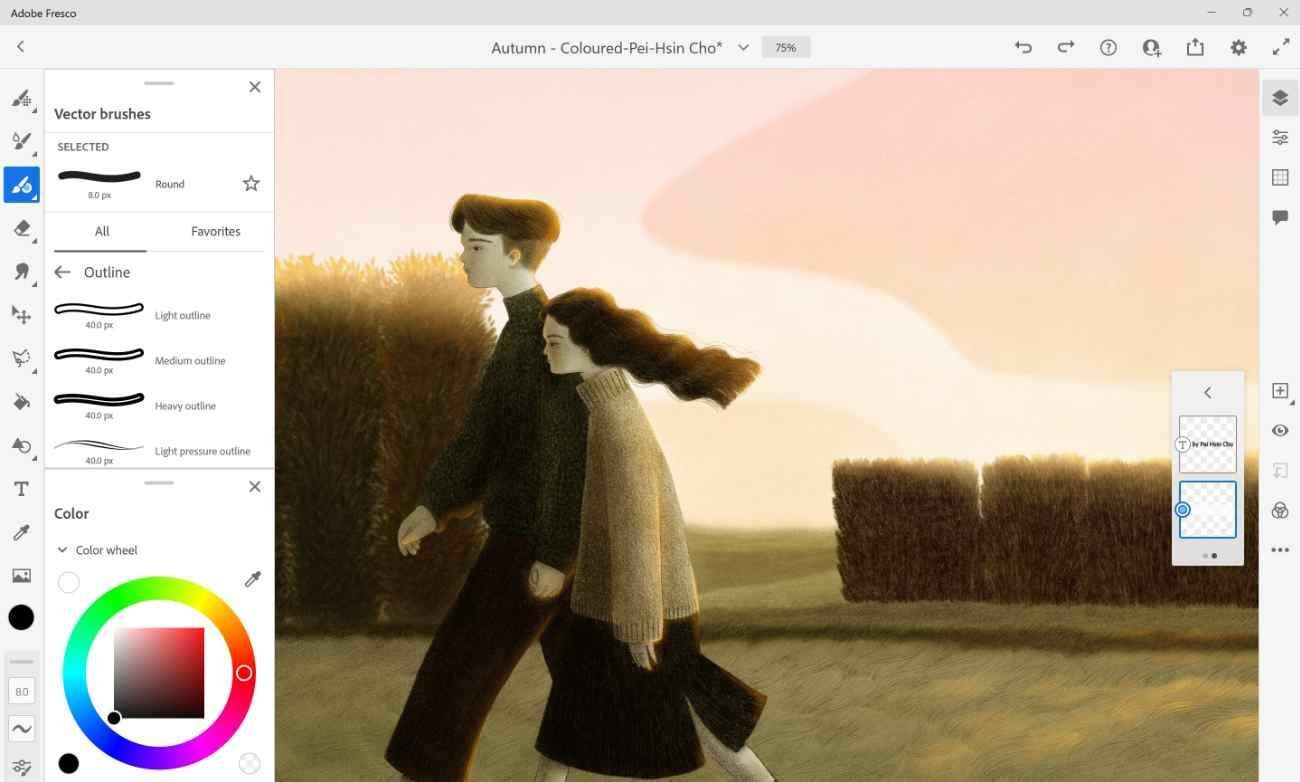
Key features:
Live vector and raster brushes
Cloud document sync
Touch and stylus optimization
Integration with Creative Cloud
Unlimited layers
Pros:
Free version available
Natural drawing feel
Seamless Adobe integration
Works on iPad and Windows
Regular brush updates
Cons:
Limited vector tools compared to Illustrator
Requires Adobe account
Best with stylus
Heavy on device storage
Some features need subscription
My verdict: Great for artists who prefer drawing vectors naturally with a stylus rather than plotting points and curves.
Final thoughts on Adobe Illustrator alternatives
These Adobe Illustrator alternatives show the diversity in vector design tools. All Adobe Illustrator competitors serve different needs.
Boxy SVG streamlines web graphics. Sketch pioneered digital design workflows. Figma revolutionized collaboration. Canva democratized design. Adobe Fresco blends artistic approaches.
Inkscape gives you freedom without cost. Affinity Designer offers professional power for a fair price.
Vectr makes starting easy. CorelDRAW excels at technical work. Gravit Designer brings flexibility through the cloud.
The key is matching the tool to your workflow. Web developers might love Boxy SVG’s clean code. Digital product teams often choose Figma. Small businesses frequently pick Canva. Artists may prefer Fresco’s natural brushes.
Test free versions where available. Many tools offer different strengths, and you might even use multiple tools for different projects. The perfect tool depends entirely on what you’re creating and how you prefer to work.
Did I miss anything? Did you try these tools similar to Adobe Illustrator? Do you have any questions or comments? Share your thoughts below in the comments section.

